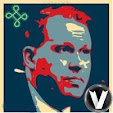 At his annual news conference, Russian president Vladimir Putin revealed that he had never been tempted to run for a third term. From the very outset, he decided never to violate the Russian constitution. The constitution stipulates a maximum of two consecutive presidential terms.
At his annual news conference, Russian president Vladimir Putin revealed that he had never been tempted to run for a third term. From the very outset, he decided never to violate the Russian constitution. The constitution stipulates a maximum of two consecutive presidential terms.As usual this pseudo-news ran as the top story in international media's comments on the news conference. As previously reported, the Kremlin has succeeded to keep speculations on a potential third Putin presidential term alive for years, and media have only been to keen to swallow the bait. That journalists simply have not been able to take Putin's word for it, only testifies to the politechnologists' successful media coup in manipulating western and Russian news coverage alike. It should also send a warning to news audiences worldwide that they run the risk of deception due to international media's one-eyedness in Russia reporting.
At the news conference Putin said: "Throughout all these eight years I have toiled like a slave in the galleys, from morning till evening and, have done so with the full devotion of my strength." This is most probably a very sincere statement, and is also in line with what Putin has previously said repeatedly. Also, people working in the Kremlin has let it be no secret that the Russian president has been quite tired and weary of his duties in recent years. So, being a slave to power does not in Putin's case have to be a fixation to power, but an actual slavery of duties. Still, media have failed to see this.
At times, it is simply appauling to see how bad the knowledge is among western journalists covering Russia, when they repeatedly fail even to get the basic facts right. For instance, only this Tuesday the BBC covered Ukrainian president's Yushchenko meeeting with Putin in Moscow. With badly covered indignation, the reporter comments on Putin's upcoming attendance to the April NATO-conference in Bucharest: "Mr Putin will no longer be Russian president in April. Elections for his successor will be held next month." It is thus suggested that Putin and his croonies do not know when his presidential term ends or that they do not care, as things will anyway remain the same. Well, I have news for the BBC: Putin was inaugurated for his second term in May 2004, which means that he has the constitutional right to remain in office for the full four years of his term, viz. until May this year. That he has every intention to exercise his presidential powers to the maximum until the last minute is also clear from Putin's own statements. Still, one cannot but sigh when even the BBC cannot get such basics right.
What is at risk is good and objective reporting about developments in Russia. As the situation is becoming increasingly severe in many fields of politics and society, news coverage is increasingly tendentious and predisposed to prejudial perceptions. The worse the situation becomes, the greater is the need for journalistic integrity and professionalism. Or else, not only the general news audience will be misled but even world leaders might base their decisions on policies towards Russia on bad information and faulty images. Getting the basic facts right might actually change assessments of developments to better cope with challenges ahead. Those challenges are great, and the greatest is perhaps coping with the myth of Russia as a reemerging great power in the world. Still, we fail to see realities as they are, and as long as we do not challenge our own prejudice, we will go on living in a world of illusions about Russia.




